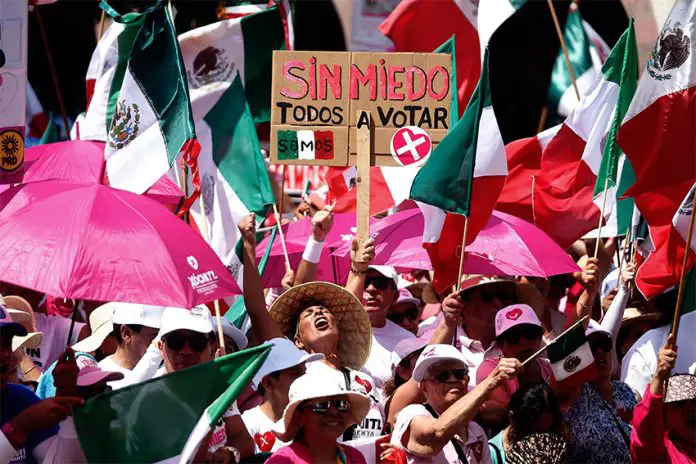In front of a sea of anti-AMLO protesters in Mexico City’s central square, presidential candidate Xóchitl Gálvez asserted on Sunday that Mexicans have a choice between “oppression” and “freedom” at the June 2 elections.
Gálvez, candidate for an opposition alliance made up of the National Action Party (PAN), the Institutional Revolutionary Party (PRI) and the Democratic Revolution Party (PRD), was the star attraction at Mexico City’s latest Marea Rosa (Pink Tide) rally, which attracted approximately 95,000 people to the Zócalo, according to the Mexico City government.
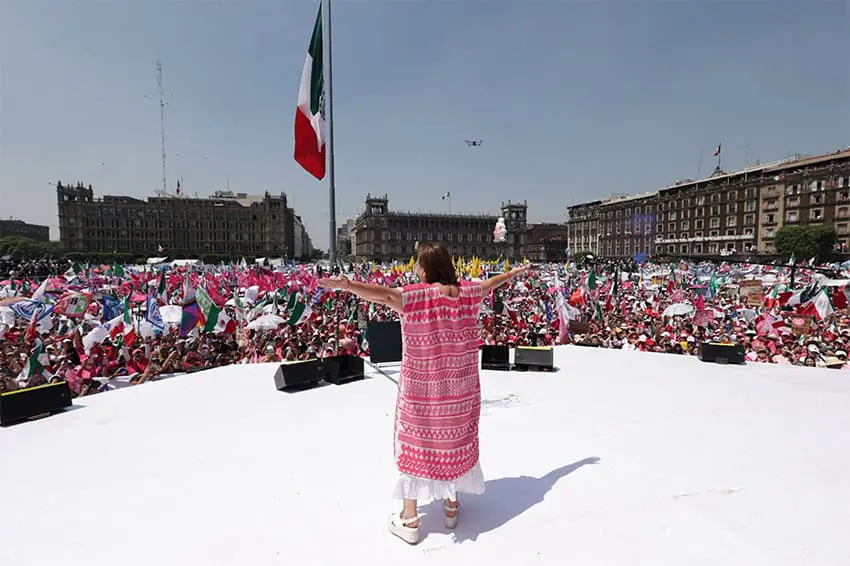
“At these elections not just the presidency is at stake, not just the Congress is at stake. Nine governorships [including the mayorship of Mexico City] are at stake. At stake are whether the coming years will be years of oppression or years of freedom,” she told the large crowd.
“Freedom! Freedom! Freedom!” roared the rally-goers, prompting Gálvez to cut short her next sentence to join in.
Gálvez warns protesters against AMLO’s “fourth transformation”
The message that the PAN-PRI-PRD candidate was aiming to send to the protesters ahead of Mexico’s June elections is that a continuation of the so-called “fourth transformation” initiated by President Andrés Manuel López Obrador (AMLO) is dangerous for the future of democracy in Mexico.
During his presidency, AMLO has been accused of attempting to concentrate power in the executive through proposed measures such as the elimination of autonomous government agencies and an overhaul of the electoral and judicial systems.
López Obrador in February sent a total of 20 constitutional reform proposals to Congress, including ones aimed at the objectives listed above. Claudia Sheinbaum, a close ally of the president and the leading presidential candidate, has expressed her support for the proposed measures, which are seen by some as an attempt by AMLO to continue to have an influence on politics after he hands over the presidential sash to his successor on Oct. 1.
López Obrador, Sheinbaum and other officials affiliated with Morena say that the measures they support are in fact aimed at strengthening democracy in Mexico and giving “the people” a greater say in the country’s affairs. They argue that previous governments ruled in the interests of a “greedy minority” and that a return to power of the PAN and the PRI is in fact the real danger Mexico faces.
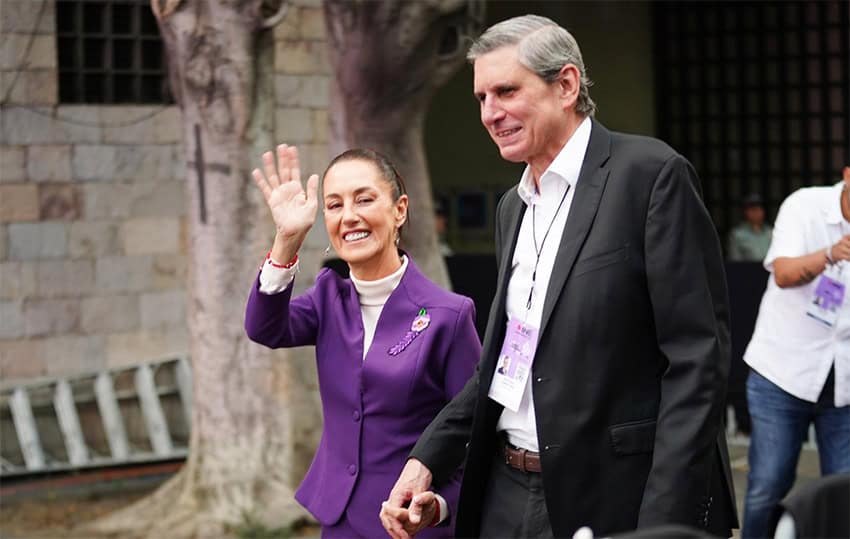
Organizers overtly support Gálvez ahead of Mexico’s elections
The demonstration on Sunday was the fourth in Mexico City of the Marea Rosa protesters, a movement that formed in late 2022 to defend the National Electoral Institute (INE) amid what opposition parties perceived as an attack by AMLO on the election authority and other democratic institutions. At the time, López Obrador and his government had recently proposed and approved a sweeping electoral reform package that the Supreme Court later struck down in 2023. The movement is known as the Marea Rosa because protesters typically wear pink to demonstrate their support for the INE, which uses pink in its logo.
While the previous rallies’ organizers were also civil society groups that support or are affiliated with Mexico’s main opposition parties, none was quite as overt as Sunday’s in its support for Gálvez and disdain for the current government.
“So that there is no confusion we say it loud and clear: The citizens [here] are not apolitical, this movement is not neutral, we can’t be neutral when [the government] wants to destroy our democratic institutions, seeks to colonize the National Electoral Institute,” Guadalupe Acosta Naranjo of the National Civic Front declared in an address before Gálvez took the stage.
“We’ve defended the INE like no one else, now it’s up to the INE to defend democratic legality,” said Acosta, who called on the electoral authority’s president, Guadalupe Taddei, to put an end to what he and others see as a “state election” that AMLO is attempting to have undue influence over.
“Ms. Taddei, the law is the law. The energy with which you watch over citizens [to ensure electoral rules aren’t violated] — show that with the president of the republic, who systematically violates the constitution,” Acosta said.
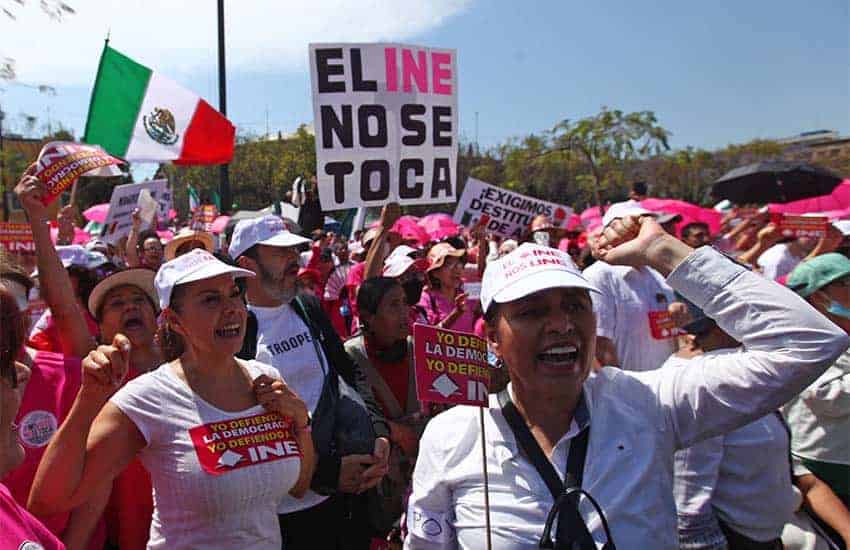
Gálvez: Elections are a choice, oppression or freedom
In her speech, Gálvez called on her supporters to vote on June 2 in order to “defend life, truth and freedom.”
“We’re going to win to give, not receive. To share, not take away. To serve, not be served,” said the candidate, who — in the polls at least — is currently a distant second to the ruling Morena party’s Sheinbaum.
“We’re going to win to listen, not to insult. To respect, not to humiliate. To unite, not to divide. To heal, not to hurt,” added Gálvez as she continued to attempt to draw a stark distinction between herself and AMLO.
“… We’re going to win to open the doors of the National Palace to all Mexicans.”
The attendees — 1 million people, according to one of the organizers — responded enthusiastically, breaking into chants of “presidenta, presidenta!” and making their views on the current ruling party clear with blunt cries of “fuera Morena!” or “Morena out!”
Protesters share their perspectives
Carlos Noriega, one of the so-called “Xochilovers” in the Zócalo on Sunday, told the El País newspaper that he was electrified by the candidate’s speech.
“She heats you up, she excites you,” he said. “Finally there is a leader who is defending [us],” Noriega said.
Tere Silva, another attendee, told El País that “this election will be a watershed.”
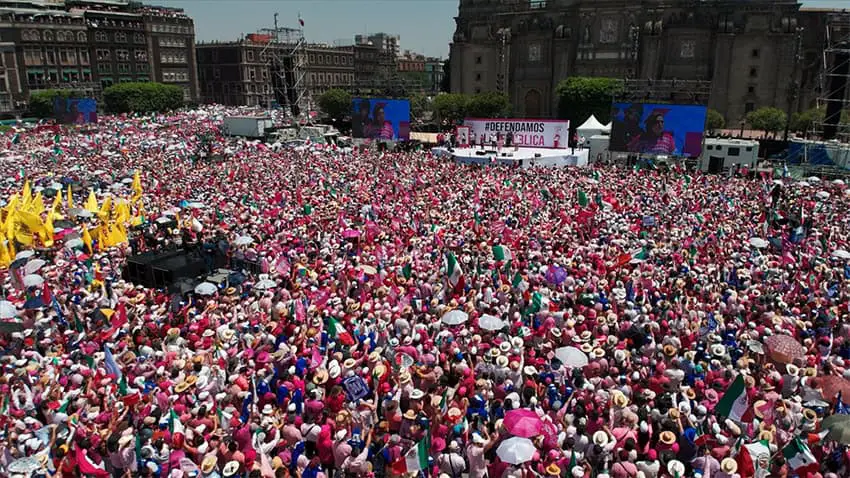
The choice is between the continuation of “this new dictatorship” and “high-mindedness,” she said.
Lorena Laboriel, another member of the Marea Rosa, said that she decided to attend the rally because she believed it was “very important to demonstrate that this election is not yet decided.”
“It’s not a [mere] formality, like Sheinbaum said,” Laboriel told El País. “That’s why I’m here.”
Before the rally, the INE president — who has faced criticism for her links to the Morena party — criticized the opposition movement’s politicized use of the color pink.
“The INE’s institutional color has been pink for many years. I think that its use by other organizations in open political support of a candidate doesn’t contribute to the respect both institutions have shown — the INE to the political parties and the political parties to the Institute,” Guadalupe Taddei said Friday.
For the majority of people who make up the so-called Marea Rosa — thousands of whom rallied in other cities across Mexico on Sunday — the use of pink and support for Gálvez doesn’t create any kind of conflict because they see her as the only candidate who can guarantee the survival of Mexico’s democracy, which for all intents and purposes is only 24 years old. Indeed, the catch-phrase of Sunday’s rally was “Let’s save democracy.”
“To save democracy, we have to support Xóchitl and remove Morena from power,” Lydia Ordóñez, another attendee, told El País.
With reports from El Economista, El País, Proceso, El Financiero and Sin Embargo
